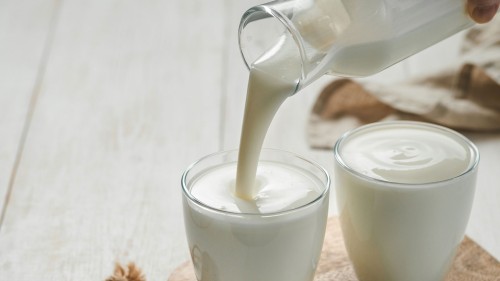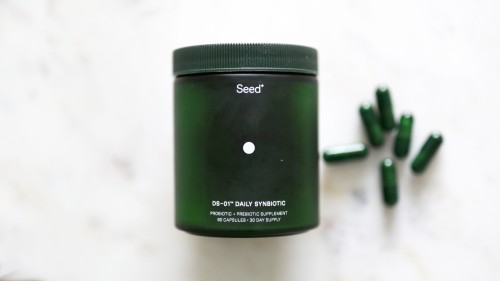WellnessVerge is reader-supported. We may earn a commission when you make a purchase through the links on this page. Learn more about our process here.
Best Probiotic Supplements for Women of 2023, According to Dietitians
Last Updated on December 27, 2022
Medically Reviewed by Anthony Dugarte, MD
Probiotic supplements have many potential benefits for women, but how do you know which one to choose? We help you decide which probiotic is best for you based on your specific health concerns.


Probiotics are beneficial bacteria that naturally reside in your body. They can be found in fermented foods or supplement forms and provide an array of health benefits.
As a woman, choosing the best probiotics to meet your specific needs can feel overwhelming. There are probiotics made to enhance your gut health but also ones that address your vaginal health.
This article will break down the best probiotic supplements to meet your individualized needs and health goals.
Summary of Our Picks
- Best for weight loss: MegaFlora Probiotic
- Best for digestive health: Pure Encapsulations Probiotic-5
- Best for vaginal health: Jarrow Formulas Fem Dophilus
- Best for immune support: EU Natural Flourish Probiotics
- Best for mental health: Lifted Naturals Bifidus Mood Boost
- Best budget pick: Nature’s Way Probiotic Pearls Women’s
- Best overall for women: Garden of Life Once Daily Women’s Probiotic
How We Chose These Brands
In addition to reviewing each product’s label for the correct type of bacteria, number of CFUs, third-party certification, and storage instructions (see section What to Look For on the Probiotic Supplement Label below), we also considered:
- Quality: Are the products made in a certified Good Manufacturing Practices (cGMP) facility? Are they third-party tested?
- Involvement of Professionals: Does the brand work with professionals to ensure the quality of its products?
- Evidence to Support Claims. Does the brand provide evidence to back up the claims of their products?
- Safety: Does the brand ensure the products are generally safe?
Benefits of Probiotic Supplements for Women
Before we dive in, let’s review probiotic supplements and how they may be beneficial for women.
Probiotics are live microorganisms that can enhance the natural beneficial bacteria in your gut. In fact, your gastrointestinal system contains roughly 39 trillion bacteria, most of which can be found in your large intestine.
Probiotics work to inhibit the growth of harmful bacteria and help enhance the growth of helpful bacteria. Helpful bacteria can support food digestion, destroy harmful cells, or produce important vitamins.
Taking probiotic supplements may help balance the bacteria in your intestines, also known as the gut microbiome.
Additionally, your vagina is home to 50 different species of microorganisms, which, when in balance, keep your vagina healthy and infection-free.
Probiotics can help to restore a healthier balance of bacteria in the vagina. An imbalance of vaginal bacteria can lead to bacterial vaginosis (BV), yeast infections, trichomoniasis (a common sexually transmitted infection), and urinary tract infections.
Maintaining balance within the body and preventing the growth of dangerous bacteria can have far-reaching health benefits. Research suggests that having a healthy balance of gut bacteria is linked to a variety of health benefits, including: (1)
- Improved digestion
- Weight loss
- Enhanced immune function
- Improved skin health
- Reduced risk of some diseases
Probiotics are identified by their specific strain. The seven most common probiotic species you’ll find in most supplements include:
- Lactobacillus
- Bifidobacterium
- Saccharomyces
- Streptococcus
- Enterococcus
- Escherichia
- Bacillus
When choosing a probiotic, it’s important to look for the specific strain of bacteria that is most helpful for your condition because different strains serve different functions.
For example, research shows that two specific species of Lactobacillus including, Lactobacillus acidophilus and Lactobacillus rhamnosus, may help prevent and treat bacterial vaginosis. (2)
Women looking for a probiotic should research the strains of bacteria that are best for their specific condition and select a probiotic that contains a high number of those strains.
Here are our picks for the best probiotic supplements categorized by specific health concerns and goals that women might have.
Best for Weight Loss: MegaFood MegaFlora Probiotic
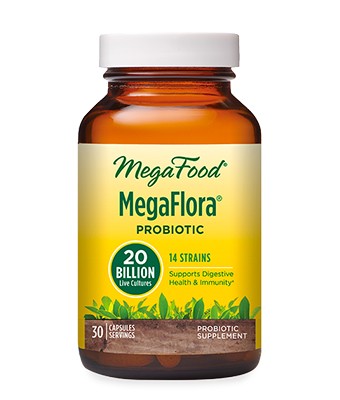
Pros
- Contains a variety of helpful strains
- Third-party tested
- Reasonably priced
Cons
- Needs to be refrigerated
- Packaging doesn’t specify concentration of individual strains
- Doesn’t contain any prebiotics
Our Take
MegaFlora Probiotic contains all three strains that have shown to be effective in supporting weight loss. Taking this supplement, in addition to making lifestyle changes, may help you reach your weight goals.
While the research surrounding the use of probiotics for supporting digestive health is strong, new research is emerging, showing that probiotics may also play a role in weight loss.
According to one 2019 review, probiotics may support weight loss by decreasing fat storage, reducing inflammation throughout the body, controlling appetite, increasing metabolism, and improving insulin sensitivity. (3)
One 2020 review of the clinical trials found that taking probiotics may potentially reduce body weight and Body Mass Index (BMI). This study found: (4)
- When treated with probiotics for a longer period of time, weight reduction was increased.
- A mix of probiotic strains (versus an individual bacterial strain) had a better effect on weight management.
- Weight reduction was enhanced when using a probiotic with a prebiotic (type of fiber that serves as food for a probiotic), modifying diet, and increasing physical activity.
Moreover, one 2018 review and meta-analysis found that participants that received probiotic supplementation had more significant reductions in body weight, waist circumference, body fat, and BMI than the control groups. (4)
When seeking a probiotic to help with weight loss, it’s important to know which strains to look for. Strains that can help with weight loss include Lactobacillus gasseri, Lactobacillus rhamnosus, and Bifidobacterium lactis. (5, 6, 7)
I would recommend MegaFood’s MegaFlora Probiotic to help support weight loss. It contains all three strains of weight-loss-promoting probiotics, including L. gasseri, L. rhamnosus, and B. lactis.
MegaFood Probiotic has 20 billion CFUs, is third-party tested, and is dairy-free and soy-free.
Price: $47.99 for a 90-serving bottle on Amazon (serving size is 1 capsule).
Best for Digestive Health: Pure Encapsulations Probiotic-5
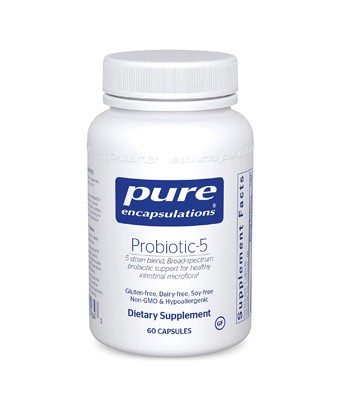
Pros
- Broad-spectrum probiotic that contains 5 strains
- Third-party tested
- Free of gluten, dairy, and soy
Cons
- Requires refrigeration
- Not readily available in many retailers
Our Take
Pure Encapsulations Probiotic-5 is a broad-spectrum probiotic that provides a variety of beneficial strains of bacteria to help promote digestive health. It’s third-party tested, free of most allergens, and reasonably priced.
From constipation to gas, probiotics may help treat various gastrointestinal concerns while supporting a healthy digestive system.
Research indicates a positive link between probiotic use and gut health. For overall digestive health, I would recommend choosing Pure Encapsulations Probiotic-5. (8)
Pure’s product contains a blend of 5 different strains of probiotics, including:
- Lactobacillus acidophilus La-14
- Lactobacillus rhamnosus Lr-32
- Bifidobacterium bifidum Bb-06 strain
- Bifidobacterium longum Bl-05 strain
- Bifidobacterium lactis Bl-04 strain
Many of these strains of probiotics can support a healthy balance of bacteria in the gut but may also promote health and wellness throughout your body. (9)
For example, both L. acidophilus and L. rhamnosus have been shown to help treat bacterial vaginosis, while L. rhamnosus and B. lactis may help promote weight loss. (2, 6)
Moreover, B. bifidum and B. longum can help support a healthy immune system. (10)
Pure Encapsulations Probiotic-5 provides 10 billion CFUs of beneficial bacteria to promote digestive health and is free of gluten, dairy, and soy. The product is vegan, third-party tested, and reasonably priced.
Dosage of the product varies from 1–2 capsules per day.
Price: A 60-serving bottle of Probiotic-5 is $39.00 on Amazon.
Best for Vaginal Health: Jarrow Formulas Fem Dophilus
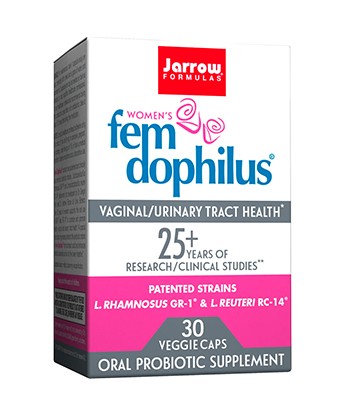
Pros
- Widely studied in supporting vaginal health
- Free of major allergens
- Third-party tested
Cons
- Requires refrigeration
- Not readily available in many retailers
Our Take
To enhance your vaginal health, it’s best to look for a product with evidence-based probiotic strains. Jarrow Formulas Fem Dophilus contains a nice variety of probiotic strains and is backed by solid research.
Just as your gut contains a variety of helpful bacteria, so does your vagina. In fact, there are over 50 different microorganisms in your vagina that keep it free from infection and healthy.
An imbalance of bacteria in your vagina can lead to a variety of issues including, bacterial vaginosis, yeast infections, an increase in urinary tract infections, and trichomoniasis (sexually transmitted infection).
There are various strains recognized by the Clinical Guide to Probiotic Products to support women’s vaginal health. These strains include:
- L. rhamnosus GR-1
- L. reuteri RC-14
- L. crispatus LbV 88
- L. gasseri LbV 150N
- L. jensenii LbV 116
- L. rhamnosus LbV 96.14
These strains have been helpful in supporting an increase in vaginal lactobacilli (healthy bacteria) and protection against harmful vaginal pathogens.
For vaginal health, I would recommend Jarrow Formulas Fem Dophilus.
The product supports vaginal health as it contains evidenced-based probiotic strains, including L. rhamnosus GR-1 and L. reuteri RC-14. It contains 5 billion CFUs, is free of major allergens, and is backed by years of clinical research.
Price: Reasonably priced at $24.99 for 30 servings on Amazon.
Best for Immune Support: EU Natural Flourish Probiotics
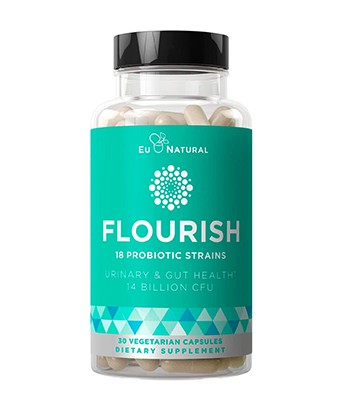
Pros
- Contains specific immune-boosting strains
- Third-party tested
- Gluten-free
Cons
- Unclear if the product is lactose free
- Can take 6–8 weeks to notice full effects
- Contains 18 different strains, some of which may have no real benefit
Our Take
If you are healthy, Flourish Probiotics may give your immune system just the boost it needs to protect you from various viruses and infections.
Recent research suggests that probiotics play a role in boosting the immune system. (11)
Studies indicate that the following strains are beneficial for immune support: (10)
- Lactobacillus gasseri
- Bifidobacterium bifidum
- Bifidobacterium longum
A product that contains all three of these specific strains is EU Natural Flourish Probiotics. Flourish Probiotics has 14 billion CFUs, has been third-party tested, and comes with a money-back guarantee if purchased through the company’s website.
It is important to note that taking a probiotic if you are immunocompromised might be dangerous. It is best to speak with your healthcare provider before taking any supplement to ensure its safety for you.
Price: Reasonably priced at $29.99 for a 30-serving supply on Amazon.
Best for Mental Health: Lifted Naturals Bifidus Mood Boost
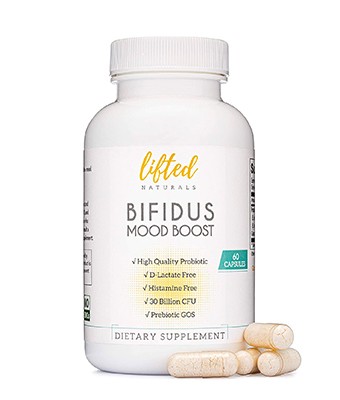
Pros
- Contains specific mental health enhancing strains
- No refrigeration required
- Gluten, dairy, and soy free
Cons
- No acid-resistant (enteric) coating which could affect absorption
- Large capsule could make swallowing difficult
- Not third-party tested
Our Take
Lifted Naturals Bifidus Mood Boost is a nice choice for women looking to support their mental health. The product contains mood-boosting strains and is reasonably priced.
Emerging research shows that the gut and brain are connected, a relationship also known as the gut-brain axis.
The gut has been called a “second brain” because it produces many chemicals as the brain does, all of which play an important role in regulating mood.
For example, the bacteria in the intestines produce serotonin, melatonin, and acetylcholine, all of which can directly impact brain functioning and mental health.
One 2016 study found that probiotic use helped improve symptoms of depression in patients using Lactobacillus acidophilus, Lactobacillus casei, and Bifidobacterium bifidum strains. (12)
In one small 2016 study, researchers found that patients saw improved depression symptoms when taking the probiotic strain B. longum. (13)
One recent study suggested that probiotics may improve mental health and can be offered as new medicines for common mental disorders. (14)
Researchers did note more clinical studies are necessary to further examine the connection between gut health and mental health.
To address your mental health needs, I would recommend trying Lifted Naturals Bifidus Mood Boost. It contains B. infantis, B. breve, B. longum, B. bifidum, all of which have been shown to support mental health.
Lifted Naturals Bifidus Mood Boost contains 30 billion CFUs and is gluten, dairy, and soy-free.
Price: Reasonably priced at $28.88 for 60 servings on Amazon.
Best Budget Pick: Probiotic Pearls Women’s
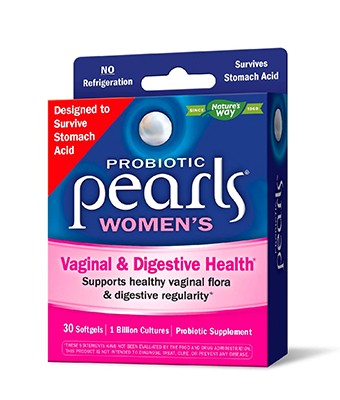
Pros
- Contains a variety of probiotic strains
- No refrigeration required
- Free of gluten, sugar, salt, wheat, artificial colors, flavors, and preservatives
Cons
- Only contains 1 billion CFUs
- Doesn’t specify concentration of individual strains
- Not third-party tested
Our Take
If you’re on a budget, Nature’s Way Probiotic Pearls Women’s is a nice choice as it contains a variety of strains to support your digestive and vaginal health. The triple-layer softgel may also increase the survivability of the strains making them more effective.
Nature’s Way Probiotic Pearls Women’s is a great product if you don’t want to spend a fortune, but also want a product designed to tackle both your digestive and vaginal health.
The product provides 1 billion CFUs and includes three strains of probiotics:
- L. acidophilus
- L. rhamnosus
- L. plantarum
This specific blend was designed to maintain vaginal health, promote digestive balance, and support your immune system.
Probiotic Pearls Women’s uses a triple-layer softgel that protects the probiotics from heat, air, moisture, and stomach acid to increase survival and delivery to the intestine.
Price: When purchasing from Amazon, a 30-serving supply is only $19.03.
Best Overall for Women: Garden of Life Once Daily Women’s Probiotic
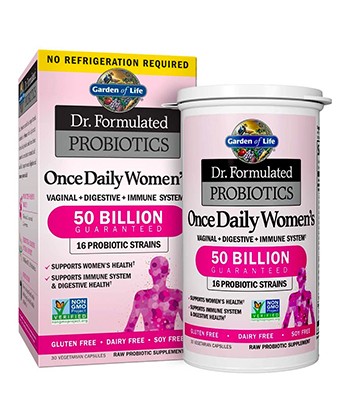
Pros
- Contains diverse probiotic strains
- No refrigeration required
- Gluten, dairy, and soy free
Cons
- Contains a variety of strains, some of which may have no real benefit
- Not third-party tested
Our Take
Garden of Life Once Daily Women’s Probiotic is chock full of diverse probiotic strains that may help address various health concerns at a reasonable price.
If you’re looking for a probiotic that may address various needs, including immune functioning, vaginal health, and digestive support, I recommend trying Garden of Life Once Daily Women’s Probiotic.
The product contains a whooping 50 billion CFUs and includes 16 diverse strains of helpful probiotics, including Lactobacilli and Bifidobacteria.
These specific strains have immune-boosting properties, help balance your vaginal bacteria, and support your digestive health.
Price: Reasonably priced at $30.09 for a 30-serving supply on Amazon.
What to Look For on the Probiotic Supplement Label
When looking over the probiotic supplement label, you will come across a lot of information which may include:
- The type of bacteria in the supplement
- The number of organisms by colony-forming units (CFUs)
- Possible third-party certification
- Whether the product must be refrigerated or not
- The proper dosage
- Whether the product is in capsule, tablet, powder, or liquid form
The product dosage and form are pretty self-explanatory — choose the type that will fit your lifestyle and preference. However, the following are tips on how to interpret the rest of the information included on the probiotic label:
The Right Type of Bacteria for Your Condition
Each type of bacteria, or strain, will have a different effect on your body. Therefore, it’s important to select a probiotic that has been studied to help your specific health concern.
Selecting a random probiotic without reading about the type of bacteria may not have the intended effect you’re hoping for.
Below is a chart listing the seven common strains of probiotics and their proposed health benefits.
| Strains | Health Benefits |
|---|---|
| Lactobacillus acidophilus and Lactobacillus rhamnosus | Treatment of bacterial vaginosis |
| Lactobacillus gasseri, Lactobacillus rhamnosus, and Bifidobacterium lactis | Weight loss |
| Bifidobacterium infantis | Controls symptoms of IBS |
| Lactobacillus gasseri, Bifidobacterium bifidum, and Bifidobacterium longum | Immune system support |
| Lactobacillus acidophilus, Lactobacillus casei, and Bifidobacterium bifidum | Supports mental health |
The Number of CFUs
The number of colony-forming units (CFUs) will tell you the number of live and active bacteria in the product.
Common CFUs can range from 5 to 20 billion colony units per day for adults. (15) As a general rule of thumb, your probiotic should provide at least 1 billion CFUs with doses up to 10–20 billion CFUs daily for adults.
The amount of CFUs you take can play a major role in how effective the probiotic is. Therefore, it’s important that you ensure the probiotic you choose has at least 1 billion CFUs per serving.
Third-Party Certification
Since the FDA doesn’t regulate the supplement industry, one way to ensure the quality of your probiotic is to look for third-party testing.
One 2015 study found that out of 16 products tested, only one matched its label claims and that supplements were inconsistent from batch to batch and pill to pill. (16)
Look for products labeled with a third-party testing seal from Consumer Labs, US Pharmacopeia (USP), or NSF International.
Shelf-Stable or Refrigerated
As far as efficacy, you will be reaping the benefits of a probiotic whether it is shelf-stable or needs to be refrigerated.
If your probiotic needs to be refrigerated, the manufacturer will generally indicate that somewhere on the label.
Additionally, if you’re confused as to how to store your probiotic, think of how it was stored when you bought it. If you found it in a refrigerated section or shipped with an ice pack, it will likely need to stay refrigerated.
If you travel often, it may be difficult to lug around a heat-sensitive bottle with you, and you may want to consider the convenience of a shelf-stable product.
The best way to store shelf-stable probiotics is to ensure they’re tightly sealed and to keep them in a cool, dry place. Heat and humidity can affect their potency.
Frequently Asked Questions About Probiotics
When is the best time to take a probiotic?
Many probiotic manufacturers recommend taking them 30 minutes before a meal because many probiotic strains cannot survive the acidic environment in the stomach. It is best to read the label on your probiotic to ensure you’re following the manufacturer’s instructions.
How do you store a probiotic?
Storing instructions can be found on the bottle and should always be followed. If your probiotic doesn’t require refrigeration, make sure you store it in a cool, dry place to help maintain ideal stability.
Which probiotic strains are the best?
Each probiotic strain is unique and, therefore, will provide a different outcome. The best strain for you will depend on your health status and health concerns.
What are other ways I can support my gut health?
Eating fermented foods is another way to enhance your gut health. Fermented foods like yogurt, tempeh, kombucha, and sauerkraut are easily absorbed and naturally enrich your healthy gut bacteria.
What are other ways I can support my vaginal health?
Staying hydrated is a great way to prevent urinary tract infections. Additionally, cutting back on highly processed foods with refined sugars can help to prevent yeast and other vaginal infections.
Do probiotics have side effects?
Are probiotics safe to take?
Probiotics are generally safe to take. According to the National Institutes of Health, probiotics may cause harm in people with severe illness or those with a compromised immune system. (19)
How long will it take for a probiotic to work?
It can take anywhere between 2–6 weeks to start seeing the benefits of taking probiotics, so it’s best to remain patient.
The Bottom Line
Many probiotics can be helpful for both men and women, but several strains have been shown to be particularly beneficial in supporting women’s health.
While the science surrounding the use of probiotics is encouraging, there is still a lot to learn about how they can best support women’s health.
Research shows that specific probiotic strains can address different health concerns making a one-size-fits-all approach challenging.
Before selecting a product, it’s best to understand your specific health concerns and research the best strains to address them.
Before taking any supplement, it’s best to speak with your healthcare provider to examine its benefits and ensure its safety for you.
At WellnessVerge, we only use reputable sources, including peer-reviewed medical journals and well-respected academic institutions.
- Gut Microbiome: Profound Implications for Diet and Disease:
https://www.mdpi.com/2072-6643/11/7/1613/htm#B70-nutrients-11-01613 - Evidence-based mixture containing Lactobacillus strains and lactoferrin to prevent recurrent bacterial vaginosis: a double blind, placebo controlled, randomised clinical trial:
https://pubmed.ncbi.nlm.nih.gov/30525953/ - The Potential Role of Probiotics in Controlling Overweight/Obesity and Associated Metabolic Parameters in Adults: A Systematic Review and Meta-Analysis:
https://www.ncbi.nlm.nih.gov/pmc/articles/PMC6500612/ - Probiotics for the Treatment of Overweight and Obesity in Humans—A Review of Clinical Trials:
https://www.ncbi.nlm.nih.gov/pmc/articles/PMC7465252/ - Effect of Lactobacillus gasseri SBT2055 in fermented milk on abdominal adiposity in adults in a randomised controlled trial:
https://pubmed.ncbi.nlm.nih.gov/23614897/ - Effect of Lactobacillus rhamnosus CGMCC1.3724 supplementation on weight loss and maintenance in obese men and women:
https://pubmed.ncbi.nlm.nih.gov/24299712/ - Beneficial effects of Bifidobacterium lactis on lipid profile and cytokines in patients with metabolic syndrome: A randomized trial. Effects of probiotics on metabolic syndrome:
https://www.sciencedirect.com/science/article/abs/pii/S089990071500461X - Effects of probiotics on gut microbiota: mechanisms of intestinal immunomodulation and neuromodulation:
https://www.ncbi.nlm.nih.gov/pmc/articles/PMC3539293/ - Lactobacillus acidophilus LB: a useful pharmabiotic for the treatment of digestive disorders:
https://www.ncbi.nlm.nih.gov/pmc/articles/PMC7692339/ - Lactobacillus gasseri KS-13, Bifidobacterium bifidum G9-1, and Bifidobacterium longum MM-2 Ingestion Induces a Less Inflammatory Cytokine Profile and a Potentially Beneficial Shift in Gut Microbiota in Older Adults: A Randomized, Double-Blind, Placebo-Controlled, Crossover Study:
https://pubmed.ncbi.nlm.nih.gov/25909149/ - Prospective study of probiotic supplementation results in immune stimulation and improvement of upper respiratory infection rate:
https://www.ncbi.nlm.nih.gov/pmc/articles/PMC5995450/ - Clinical and metabolic response to probiotic administration in patients with major depressive disorder: A randomized, double-blind, placebo-controlled trial:
https://www.sciencedirect.com/science/article/abs/pii/S0899900715003913 - Probiotic Bifidobacterium longum NCC3001 Reduces Depression Scores and Alters Brain Activity: A Pilot Study in Patients With Irritable Bowel Syndrome:
https://www.gastrojournal.org/article/S0016-5085(17)35557-9/pdf - The Effects of Probiotics and Prebiotics on Mental Disorders: A Review on Depression, Anxiety, Alzheimer, and Autism Spectrum Disorders:
https://pubmed.ncbi.nlm.nih.gov/31914909/ - Probiotics:
https://pubmed.ncbi.nlm.nih.gov/19007054/ - Validating bifidobacterial species and subspecies identity in commercial probiotic products:
https://www.nature.com/articles/pr2015244.pdf - Probiotics Fact Sheet for Health Professionals:
https://ods.od.nih.gov/factsheets/Probiotics-HealthProfessional/ - Probiotics:
https://pubmed.ncbi.nlm.nih.gov/20208051/ - Probiotics: What You Need To Know:
https://www.nccih.nih.gov/health/probiotics-what-you-need-to-know



